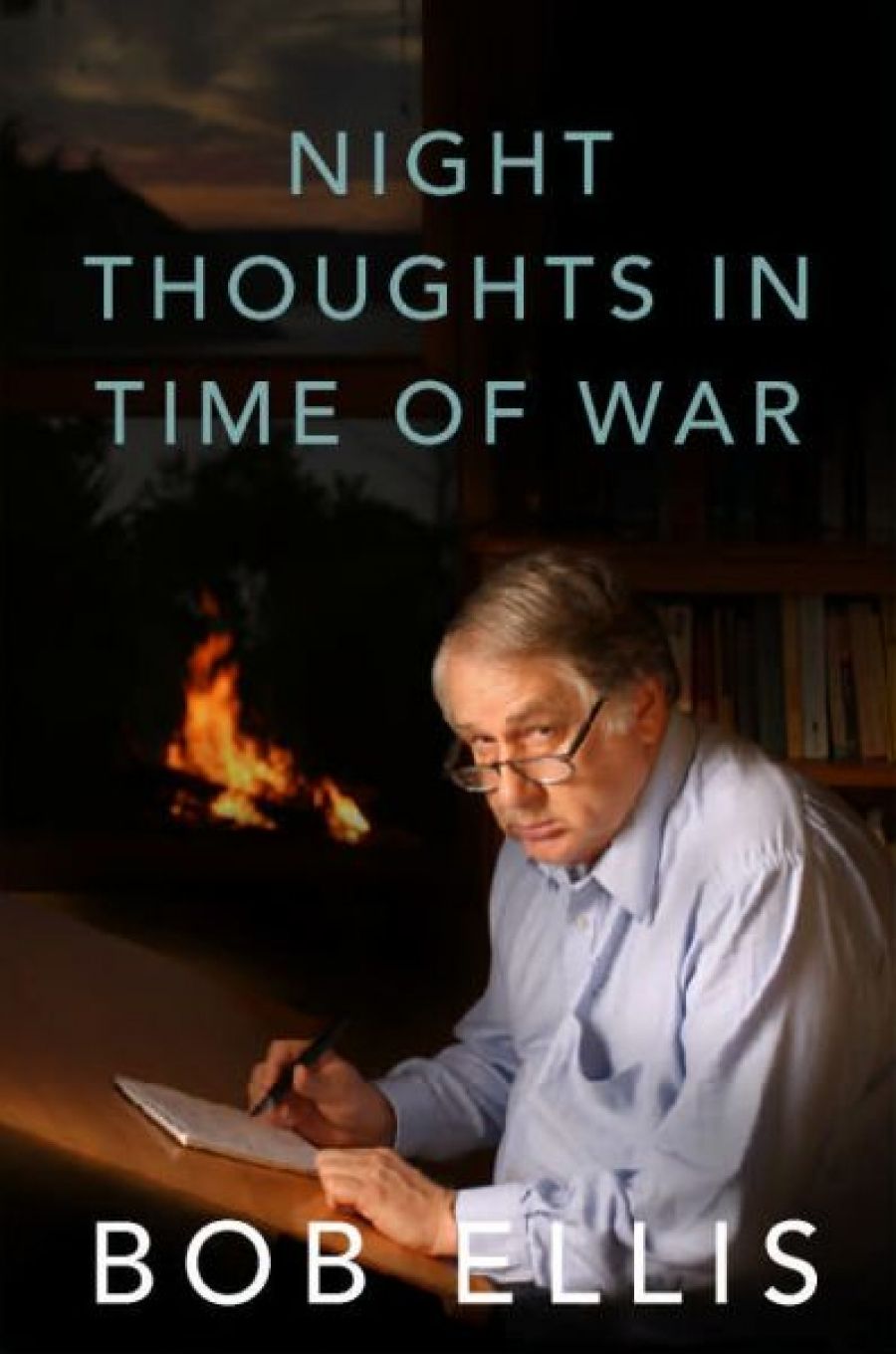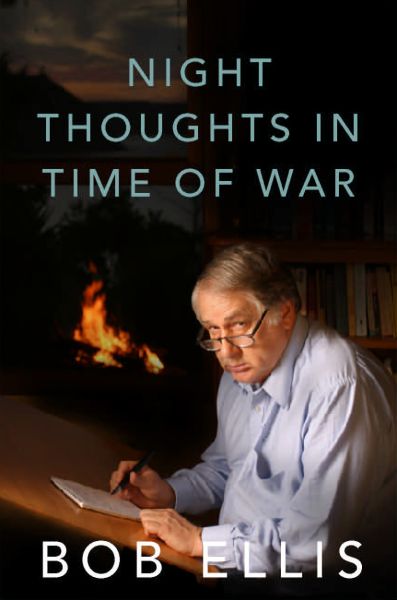
- Free Article: No
- Contents Category: Memoir
- Review Article: Yes
- Article Title: The Huge Bombard of Sack
- Online Only: No
- Custom Highlight Text:
What the hell is Bob Ellis? Discuss. Ellis might put it like this himself. Chances are he’s asked the question of a street window once or twice in wonderment and mock self-mockery. He’s earned it. From the back-cover blurbs down the years, one has got, by way of label, ‘l’enfant terrible of Australian culture’ (The Inessential Ellis, 1992), ‘a kind of dusty national icon’ (Goodbye Babylon, 2002) and now, in a disappointing regression to understatement, ‘a political backroomer’. We can assume, I think, that these are self-descriptions. Another, from the text of Goodbye Babylon, puts it this way:
- Book 1 Title: Night Thoughts in Time of War
- Book 1 Biblio: Viking, $29.95 pb. 342 pp
- Book 1 Cover Small (400 x 600):

- Book 1 Cover (800 x 1200):

Here he is: the self-fashioned dark clown of Australian politics – Bob Carr’s Falstaff, Kim Beazley’s would-be herald, Bronwyn Bishop’s bête noire. Even in the words of other people, the range of Ellis conservatively spans every point between ‘a poisonous toad’ (Mark Latham, as quoted by Ellis) and ‘a fine Labor speech writer and historian’ (Latham again). And don’t think for a moment that all this Ellis circling is gratuitous, or even merely fun, because he is, in every sense, one of his own great subjects. Some diarists speak to the void. Ellis speaks – with courage – to the mirror half-turned:
Alcohol, and also alcohol hangovers, are a great source of self-doubt and self-criticism and without them you think you’re always right, without them you hold firm to your foolish beliefs, in my case the truth of Noah’s flood and Christ’s resurrection, in Blair’s case the Satanic evil of Saddam Hussein and his fistful of toxic weapons.
Night Thoughts in Time of War is a diary and a scrapbook of Ellis’s speeches and articles, and also of the quiet, crafted writing of Anne Brooksbank. The time sequence and scope are plastic, making connections, overlapping. ln effect, the story picks up where Goodbye Babylon left off, with a scene of Ellis and Father Frank Brennan sharing a doona on a bus out of Woomera. This communion of literal and symbolic doona is a fair Ellisian motif. Men, at night, taking comfort from one another in talk and black humour; a couple of wise birds sharing feathers on a voyage to make things better, or at least to feel and record how bad things are. As Ellis explains:
It is my belief now that Judge Bhagwati, and even Bob Ellis, are better judges of Woomera because, unlike Philip Ruddock, they have been there, and their assessment of a culture of irrational persecution, emotional torment, beatings, theft, low-level enslavement, routine humiliation and what must be called by its legal definition, child abuse, shames Australia in unprecedented ways before the thinking and watching world.
Through the long dark night of John Howard’s third term, Ellis follows many nightmares, and a few dreams. The early mortality stuff, run through with the micro/macro cliche of sick-narrator/sick-world, is not his best work: ‘Death is stalking me, I know, and like Antonius Block in The Seventh Seal I am playing chess with death and I still have so much to do: free the Bakhtiyaris, appoint Kim Beazley prime minister, write my War and Peace, direct my Jules and Jim.’ On the subject of artistic yearning, Ellis said it better in The Inessential Ellis, where, in a piece called ‘Night Thoughts on the Early Death of Richard Beckett’, he referred to ‘the maddening radiance of the undelivered masterpiece’. There’s only one way to put out that light.
If Night Thoughts has a governing plot line, it is the Iraq War. Bob Ellis covers it for us from right here, in Australia. This means plenty of reportage based on close attendance to the radio and the television. Too much, in fact. At one point, he records twice, on facing pages, the identical line from a London Arab newspaper. It’s hard to write well in the mode of a press-cutting service, and Ellis, for all his mirror scenarios and ‘what-if’ newscasts, doesn’t pull it off.
As a consequence of this book’s interest in the Middle East, there is less of Ellis’ s bitter love song to the Labor party. It’s a shame, because he does it so well and because no one, possibly barring Margaret Simons, writes current politics nearly as impressively. The things he hears downstage are often immortal. And one of his real gifts is portraiture. When you read, in his description of Edvard Teller, the line, ‘He had Kissinger’s godlike voice, a face like so much condemned veal’ you say, inwardly, yes! and then, how?
Oscar Wilde said that to love oneself is to begin a lifelong affair. ln reality, it’s not as easy as that. A thousand try-hard memoirists could learn a lot from Ellis. You have to put yourself at stake. You have to get hurt. Ellis is a bleeding heart, and he’s proud of it, and he should be.
The federal election was called as I was writing this review. Coverage of the football on local ABC radio broke off to announce the date and to give thin air to the party leaders. Ellis, I imagine, was listening too, jotting down an atmospheric phrase about Pittwater and then moving to the meat of another portentous entry. Will Ellis, on October 10, be forced into deeper night by the Howardian politics of us-and-them? Or will he, for a change, be keeping a pursed eye on the Age of Latham and what he almost hopes will be the politics of us?


Comments powered by CComment